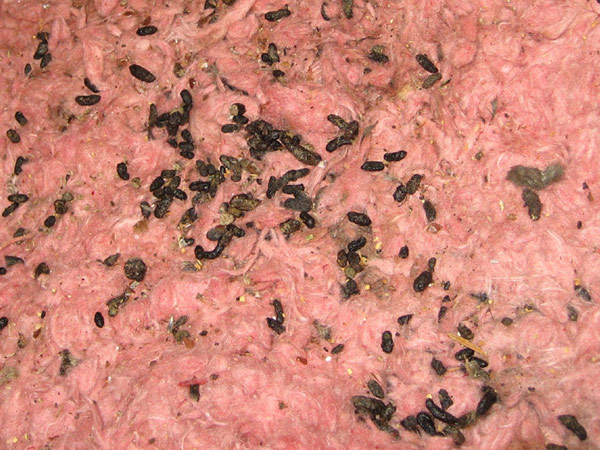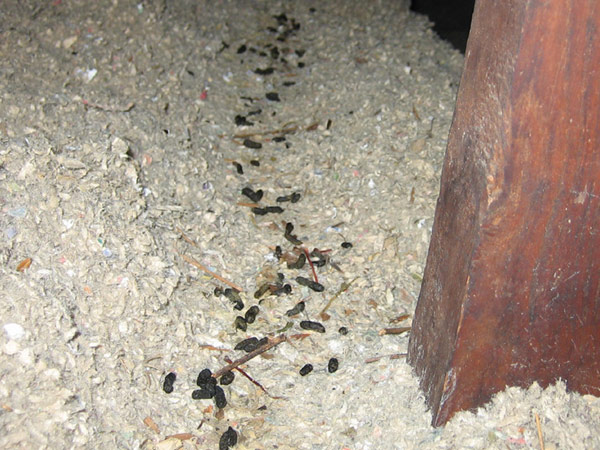- info@wildlife-removal.com
Call us for help in your town
Wildlife Removal Education
Photographs of Rat Poop
Need rat removal in your hometown? We service over 500 USA locations! Click here to hire us in your town and check prices - updated for year 2025.
NEED HELP? EMAIL ME! poop@wildlife-removal.com
Email me a photo of the animal feces you found, and I'll tell you which critter made it!
The below photos should help you properly identify the animal poop that you
see. These are pictures of rat poop. If you see these types droppings in
your attic or yard, they were made by a rat.
RAT POOP DESCRIPTION: Skinny pellets, usually about 3/8 inch long and 1/8 inch in diameter, rounded tips and maybe slightly bulging in the center. with some size variance. Fresh ones are dark brown, but they get lighter with age.
Looks very similar to squirrel, only a little bit thinner and darker, on average.

Rat poo in pink insulation in attic.
This is a rat droppings page. For mice, Click here for photographs of mouse poop.
The above image of rat feces was photographed in the attic of a house with a rat problem. I was able to identify the type of animal by inspecting the turds. Once I know what type of critter is in the house or
the crawlspace, ceiling, yard, or any other part of the property, I can take the proper steps to get rid of the unwanted rodents.
Does rat poop cause any health risk or disease concerns? Yes, over 30 different types of disease are associated with rats and their droppings. They include the Rickettsia virus, which can create a condition similar to chicken pox.
Hantavirus is another. Eosinophilic Meningitis is an infection of the brain, and caused by rat lung worm. The droppings of rats can cause Leptospirosis or Salmonellosis.

Rat feces trail in gray attic insulation.
I have more pics of rat poop here on my website, or I can send some more to you if you write to me. I don't think anyone else out there has as many images of rodent poop and droppings as me - I often take photos of animal
droppings to show the customer what kind of animal they have, and so that they can decide if they need me to clean up the rat waste, the scat and urine, and decontaminate. If you need to know how to identify rat poop, pictures
such as the ones above are the best bet, but you can take a photograph and send it to me, and I'll tell you what kind of animal droppings you have. Read about Rat Poop vs. Mouse Poop.
How do I clean up the rat latrine? You must remove as many of the droppings as you can, by hand or vacuum, including any soiled and dirty insulation and bag it in plastic bags. Be sure to wear gloves and a HEPA respirator mask, and even a Tyvek suit. I then spray / fog the area
with a special enzyme cleaner, but any good disinfectant will suffice. Read more info on my: attic cleanup and restoration page or any of the below articles I've written about rat control methods.
Rat removal info - main rat removal information page.
How are rats getting in - this is what you need to read if you want to solve the problem.
How to trap a rat - you're going to have to trap a few as well, so you need to read this too.
How to get rid of rats - just another general guide.
Rat in building - general information on different parts of buildings rats get into.
Rat damage photos - just so you know what they are capable of, and so you can see the signs.
Pest control for rats - why to never hire a regular pest control company to do rat work.
How to kill a rat - another guide, helping to humanely solve the problem.
Rat prevention - some tips to keep rats away, and lessen the number in the area.
Rat repellent - do repellents and rodent deterrents work?
Rats in the attic - a good guide to one of the most common problem areas with rats.
Photos of rat poop - for identification purposes.
What diseases can you get with rat dung?
Rat feces are dangerous, just as are any rodent droppings. Fecal material from any animal can cause disease just from the bacterial overgrowth present after a period of time. When it comes to rodent feces specifically, the most well-known virus associated with contact is Hantavirus. Hantavirus is a concern with rat droppings because it can be spread through primary contact or through secondary contact. You do not have to touch the rat or the feces to contract Hantavirus. If let unattended, rat feces will eventually dry out and break down into powder. Any disruption of the fine dust will force it into the air where Hantavirus particles can be inhaled. The lung infection that results from this contact can be life threatening. Many people are not aware they have contracted Hantavirus until symptoms have progressed to the point of hospitalization. Most people assume they have the flu. Hantavirus is not the only illness associated with rodent feces. Salmonella is a serious concern but has a lower death rate than Hantavirus. In addition to rat feces being toxic, the urine left behind from rodents may contain Leptospirosis, another potentially deadly infection.
Customer email about rat poo:
Hi David, I'm a bit confused about the wildlife web sites seems Wildlife Removal Services, Inc is somehow connected anyway I realize you are in Orlando (I am in Hollywood Florida ) and I understand this is more expensive. I have something in my attic, and
based on the photographs on your website, I'm sure that my attic is full or rat droppings.
I read a lot of material on rat exclusion including articles from university studies (and your rat blog) and it all seems very challenging. I really want a professional (not a franchise person looking to gain a fast buck ). It appears aa is a franchise like the other wildlife companies but the Hollywood trapper does not appear to have your extensive skill set or passion. I have a rat problem (one story slab on grade with a flat roof - no attic or attic crawl space) and can not figure out how they are getting into the building. I have screens the roof vents/stacks, done exclusion that I could see (i.e.; new roof flashing, some hardware cloth in areas etc.) and still a problem... Could be under the slab and making their way thru plumbing or could be under the cement patio and digging. Thanks in advance for your time in responding to this email. Deb
My response: It could be plumbing, if your house has no openings that you can see. But of course, without seeing the house myself, I can't know. I can make an appointment to come to your house to do a full inspection. The rat droppings do a good
job of giving me a clue as to where the rodents are living.


















